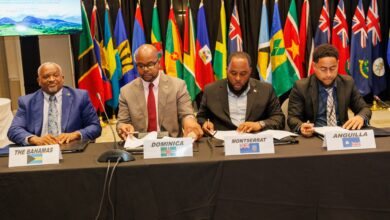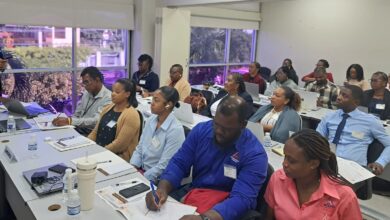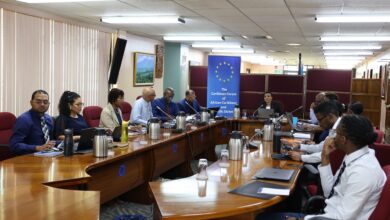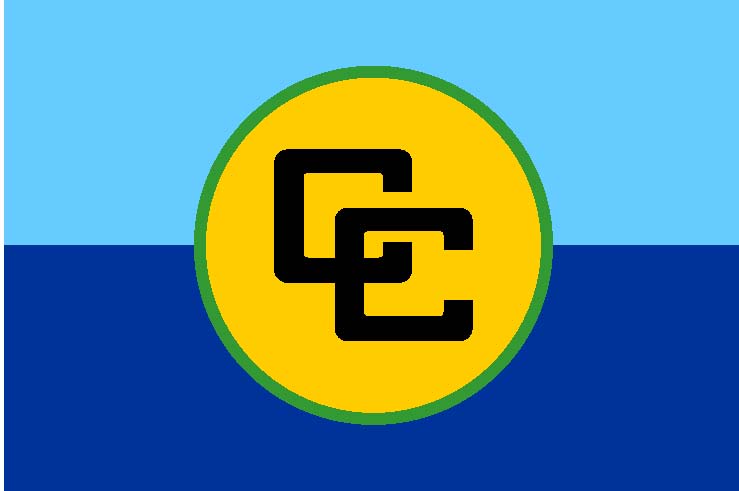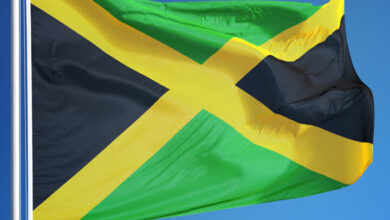With specific focus on issues pertaining to health, the Fourteenth Meeting of the CARICOM Council for Human and Social Development (COHSOD) was held at the Eastern Caribbean Central Bank, (ECCB) St. Kitts and Nevis on 27-28 April 2006, under the chairmanship of the Hon. Bernard Nottage, Minister of Health of The Bahamas.
The Meeting was attended by the Hon. Dr. Denzil Douglas, Prime Minister of St. Kitts and Nevis, Ministers of Health for CARICOM Member and Associate Member States, Regional Health Officials including Chief Medical Officers, and representatives of Regional Health Institutions such as the Caribbean Epidemiology Centre (CAREC) and the Pan American Health Organisation (PAHO). Experts in specific areas such as health financing and the development of a Health Plan for Cricket World Cup 2007 made specialised presentations and assisted the COHSOD in its deliberations.
The Meeting of the COHSOD was preceded by the Fourteenth Meeting of Chief Medical Officers (CMOs) on 24-25 April, and coincided with the Fifty-First Annual Scientific Meeting of the Caribbean Health Research Council (CHRC) on 26-28 April 2006. Both Meetings were held at the St. Kitts Marriott Hotel, the former providing technical inputs on health matters for the guidance of Ministers, and the latter seeking to ensure that policy decisions were based on the best available health research.
The Opening Ceremony was addressed by Dr. Edward Greene, Assistant Secretary-General, Human and Social Development, CARICOM Secretariat; the Hon Rupert Herbert, Minister of Health and the Environment, St. Kitts and Nevis; Dr. Mirta Roses Periago, Director, PAHO; The Hon. Bernard Nottage, Minister of Health, The Bahamas; Amb. Orlando Galveas Oliveira of the Federal Republic of Brazil; and the Hon. Dr. Denzil Douglas, Prime Minister of St. Kitts and Nevis. These addresses analysed the linkages between health and development, recent achievements in the area of health such as the eradication of polio and the negotiation of common low prices for ARV’s with the assistance of the Clinton Foundation.
The highlight of the Opening Ceremony was the signing of a Letter of Intent between CARICOM/PANCAP and the Federal Republic of Brazil for HIV/AIDS Care and Treatment for the OECS and other support exchange programmes with the Pan Caribbean Partnership in the fight against HIV/AIDS (PANCAP). Under this arrangement, the OECS would receive free ARVs for 500 infected persons. This illustrates the catalytic role of PANCAP and is an example of a Regional Initiative having a Sub-regional impact. Cooperation with Brazil is also envisaged in the area of training and in the production of ARVs.
Among other areas in the agreement are Technical Cooperation in monitoring and evaluation; Support for human resource development initiatives especially to build capacity and strengthening bilateral relations with Guyana and Suriname for activities in prevention and treatment of HIV/AIDS.
Emphasis was also placed in the opening addresses on the importance of behaviour change with regard to both communicable and non-communicable diseases; the need for adequate financing for Regional Health Institutions; the need to expand the Region’s strategic partners; and the imperative of developing a strategic health agenda for the Region.
Appreciation was expressed to the Hon John Junor, former Minister of Health of Jamaica, for his dedication to the work of the COHSOD for over a decade and to Mr. Vincent Sweeney, Director of the Caribbean Environmental Health Institute for the past fourteen years who was demitting office, for his commitment to regional environmental health.
The Agenda focused on a wide range of issues including developments under and implementation of the Caribbean Cooperation in Health (CCH III) Initiative and the PANCAP, the two pillars of the Nassau Declaration –The Health of the Region is the Wealth of the Region issued by CARICOM Heads of Government in 2001. With regard to the CCH III, it was recommended that emphasis be placed on cross cutting and enabling priorities including health information systems, human resource development and health promotion. With regard to the management of the Initiative, the need for monitoring its implementation and the strengthening of the CARICOM Secretariat Health Desk were identified.
With regard to the PANCAP, it was noted that this mechanism which focuses on regional interventions was on track to deliver on its indicators with 6 being over-achieved, 10 achieved and 3 under-achieved due to delays in the signing of Memoranda of Understanding (MOUs). It was agreed to expedite implementation and to restructure the Mechanism to address new Global Fund conditionalities and new modalities such as stigma and discrimination and prevention, care and treatment of persons living with HIV/AIDS.
Other issues addressed on the Agenda included Mental Health; Nurses Training, Examinations and Migration; Avian Flu; Infectious Diseases; Non-Communicable Diseases; Drug Demand Reduction; a new Governance Structure for Regional Health Institutions; CARICOM–Cuba Health Relations; the free movement of Health Professionals in the CARICOM Single Market and Economy (CSME) and the development of a Health Plan for Cricket World Cup 2007. In this regard the meeting agreed to establishing a CARICOM Health and Antidoping Sub-Committee chaired by the Minister of Health, Jamaica with representation from each country. Its task would be to monitor developments and assist in coordinating activities in collaboration with the ICC/CWC Directorate of Health and Anti-doping. The COHSOD received and considered a presentation form Chief Medical Officers which provided technical analysis and recommendations on several of the other issues identified above.
In fulfillment of a mandate from CARICOM Heads of Government on the desirability of a Regional Health Financing Scheme, a Special Panel Discussion was held to brainstorm on the feasibility of such a scheme. Presentations were received on different aspects of health financing from experts including the CEO, National Health Fund of Jamaica; the Assistant Vice President, Risk Selection, Underwriting Department, Sagicor; and the President of Blue Cross of Jamaica. The PAHO representative indicated his agency’s willingness to assist in the process of development of a Regional Health Financing Scheme.
Delegates noted that the next Special Meeting of the COHSOD was scheduled for June 2006 and would focus on HIV/AIDS Education, while the next Regular Session of the COHSOD was scheduled for October 2006 and would focus on Education and Labour.
The COHSOD thanked the Government and people of St. Kitts and Nevis and the ECCB for their warm hospitality and the excellent arrangements put in place for the conduct of the business of the Meeting.
28 April 2006

